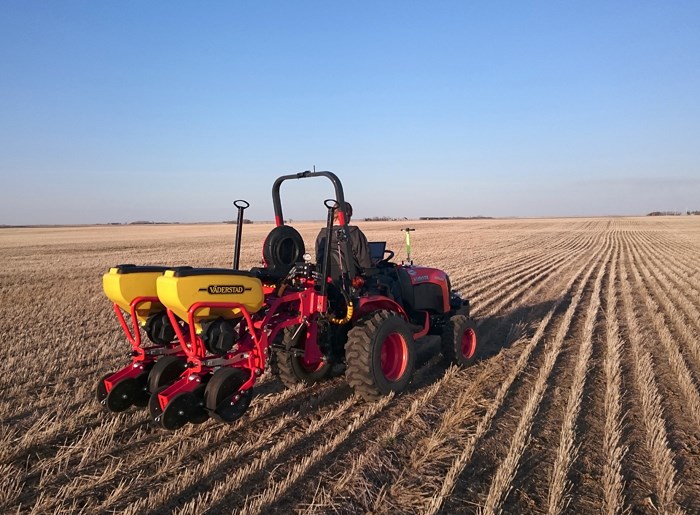Yorkton, the University of Regina and Saskatchewan were all very well-represented May 7 at an international competition in Indiana May 6.
A team from the engineering program at U of R, which included Yorkton brothers Joshua and Caleb Fredrick along with Dean Kertai and Sam Deitrich from Regina, took home first prize in the 2016 AgBot Challenge.
The contest paid out $50,000 to the four young men. So far, the young men, who graduate this year, do not have plans for the money, Joshua said.
Nathan Muchowski, a University of Regina engineering alumnus, tied for third place and received $20,000 representing Muchowski Farms, his family’s seed farm operation near Odessa, Saskatchewan.
Teams were challenged to “develop the most efficient unmanned crop seeder capable of planting two varieties of seed over half-mile-long rows, while providing real-time data utilizing a mobile tracking antenna.”
Specifically, the seeding system had to make 12 passes, seeding two rows per pass and finish approximately one acre fully autonomously while observing 15 criteria and remotely performing analytics and reporting on things such as down pressure, seed weight, seed rate, fertilizer weight, fertilizer rate, speed and direction.
“It was a very ambitious project,” Joshua said. “There was a lot of deliverables they were asking for and a fairly short period of time to accomplish all of them in. Most people were working on building their prototypes for the first couple of months. We and the other teams really only had about a month to test things in the field.”
He suggested they may have had the good luck to have bad luck before the day of the competition.
“We were kind of fortunate in the sense that we were able to pull a lot of things together and a lot of bad things that happened to other teams [during the competition] happened to us when we were testing so we were able to make the tractor do what we wanted it to do. We were able to plant 12 rows of corn and all the navigation was done by itself and the judges were really impressed with our user application and the feedback that we were displaying through it and just the ease of use.”
The U of R prototype featured a two row-seeder donated by Seed Hawk attached to a 26-horsepower Kabota tractor obtained at what Caleb described as a “massive discount” through Young’s Equipment guided by a SwiftNav GPS donated by Piksi.
While small in scale, Caleb suggested the potential is much bigger for their invention.
“The goal of our project was that it could be scalable,” he said. “Obviously, people aren’t planting their fields with 26 horsepower tractors, so we wanted to make it so it could be scaled up easily to a larger scale tractor so that’s how we developed it.”
Joshua, who has already started a job with engineering firm WSP, said they are also entertaining the idea of turning their win into a business.
“It’s a possibility,” he said. “Obviously there’s a lot of work that needs to be done before it could become marketable. It’s just a prototype right now, so it needs to be kind of beefed up; it would need some more robust parts to be commercial.”
The team has already caught the attention of some very big players in the agriculture industry. They said the judges at the competition were industry people from the likes of Monsanto, The Climate Corporation and Yamaha. They will travelling and showcasing the technology over the coming months.
The AgBot challenge is the brainchild of Steven Gerrish, who in addition to managing his family’s agricultural business Gerrish Farms is the founder of a venture capital firm called Apex One Equity. That company’s business profile says it specializes in “early stage companies including university-based technology start-ups.
The other teams in the 2016 AgBot Challenge were, Indiana University-Purdue University Indianapolis (IUPUI); Purdue University; Virginia Tech University; Michigan State University; Ohio State University; MESATech; Grit Robotics and Pee Dee Precision Ag.
Second Place and $30,000 went to Purdue, while PeeDee Precision Ag shared third with Muchowski.




